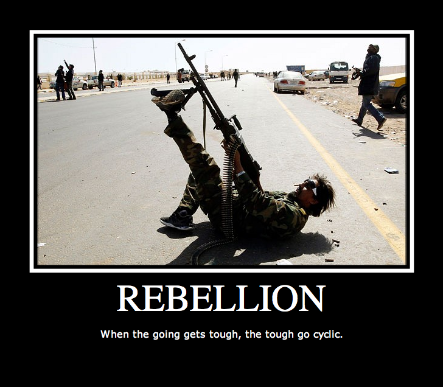Freelance jihadists huh? So this is what our no-fly zone is supporting? I will say that not only does Gaddafi suck, but to support the opposition is not a good idea either. I vote on staying out of the thing completely, and let the kids fight it out.
Both articles that I have posted below should definitely give anyone thinking about supporting these rebels a pause. To think that coalition pilots are providing over watch and even CAS for rebel forces that quite possibly have Al Qaeda sympathizers in their ranks or even freelance irhabists working along side is disturbing. Especially after all we have been through in this war.
And if that doesn’t get you fired up, then read the Destination Martyrdom article that Newsweek published in 2008. That many of the foreign suicide bombers in places like Iraq or Afghanistan came from Libya, and they certainly killed innocents and soldiers alike. So these are the people we are supporting? I say let both sides of this conflict destroy each other, and stay out of the way. Not to mention the costs of such operations?…..
Here is the analogy I have for Libya and all of these uprisings in the Middle East. This is a raging forest fire, and in the world of forest fire fighting, when you have a ‘gobbler’ or fire that is uncontrollable, then you stay out of it’s way and let it do it’s thing. Because to do anything to try and stop this massive force of nature would be a waste of resources and man power, and a needless risk of life. The only things you can do for gobblers is to evacuate people (which has been done in Libya), and put up a buffer around things you hope to save (which nothing has been done about the oil facilities in Libya).
The time where you fight a fire, is when you have the highest chance of success–and that is when it is small or manageable due to the terrain or weather. Or to attack when the fire or the elements that support fire, are weakest and your forces are ready and capable. That is how you deal with fire, and that is how you deal with the ‘fires’ burning in the Middle East.
Which brings me to the Saudi Arabia/OPEC question. If things blow up in the major oil producing countries, I could foresee some kind of effort to secure the oil facilities. That would be an appropriate use of military force, because those facilities are crucial to the world’s oil market stability. We can survive Libya being out for the count, but with countries like Saudi Arabia–that is the kind of thing you want to protect because those oil producing facilities are the life blood of the world.(Robert Baer mentioned the same thing in his book ‘Sleeping With The Devil‘) I would classify that as putting a buffer around the things you want to save during a raging fire. Other than that, get the hell out of the gobbler’s way. –Matt
‘Freelance jihadists’ join Libyan rebels
‘Freelance jihadists’ join Libyan rebels
Ex-al Qaeda member speaks out
By Eli Lake
March 29, 2011
A former leader of Libya’s al Qaeda affiliate says he thinks “freelance jihadists” have joined the rebel forces, as NATO’s commander told Congress on Tuesday that intelligence indicates some al Qaeda and Hezbollah terrorists are fighting Col. Moammar Gadhafi’s forces.
Former jihadist Noman Benotman, who renounced his al Qaeda affiliation in 2000, said in an interview that he estimates 1,000 jihadists are in Libya. (more…)

